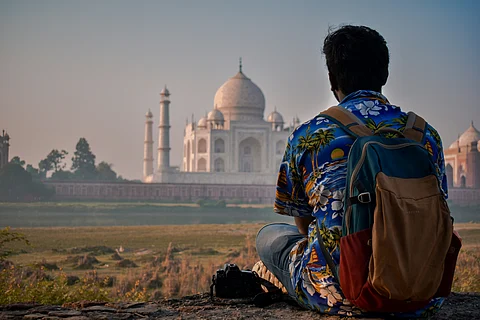
- Destinations
- Experiences
- Stay
- What's new
- Celebrating People
- Responsible Tourism
- CampaignsCampaigns
- SubscribeSubscribe
- Buy Now

For generations, travel in India has been a source of leisure, exploration, and family bonding. But in recent years—especially post-pandemic—there’s been a noticeable shift in the mindset of Indian youth, particularly those in their twenties when it comes to summer travel. Gone are the days when summer vacations were simply about sightseeing and visiting popular tourist spots. Today’s young adults gravitate towards more meaningful, purposeful journeys that spark reflection, social awareness, and personal growth.
More and more Indian students and young professionals are choosing trips beyond relaxation. These journeys help them disconnect from routine, immerse in new realities, and return with something far more valuable than souvenirs—introspection, empathy, and real-world understanding.
Whether volunteering in underserved communities, joining environmental clean-up drives, working on organic farms, or attending mindfulness retreats, many Indian youths now see summer as a time to make a difference. These aren’t just vacations—they’re transformative experiences that leave a lasting impact.
This shift isn’t limited to students. Many working professionals in their twenties and early thirties also opt for purpose-driven getaways. Their idea of “a break” now includes learning something new, building connections, and engaging in work that brings joy and a sense of contribution.
One of the biggest catalysts for this trend is the growing awareness of social and environmental issues. Today’s generation is more conscious of tourism's ecological and cultural footprint. They’re rejecting the one-size-fits-all tourism model and embracing more responsible travel—staying in eco-lodges, choosing homestays over hotels, avoiding plastics, supporting local artisans and businesses, and engaging with communities in meaningful ways.
Travel platforms that offer socially responsible experiences—such as teaching children, rewilding programs, or wildlife conservation volunteering—are gaining popularity among Gen Z and millennials.
Purposeful travel is often more affordable than traditional luxury vacations. It focuses on simple lodging, local cuisine, and hands-on engagement, making it ideal for college students and early career professionals who want to explore without exhausting their savings.
A weekend trek that includes trail clean-up or a rural volunteering stint with basic accommodation can offer a high-impact, low-cost travel experience that creates lasting memories without burning a hole in your pocket.
Today’s youth are also turning to travel as a way to care for their mental health. With rising awareness around emotional well-being, more young Indians are using travel as a chance to pause, reflect, and reset. These trips don’t necessarily revolve around sightseeing—instead, they focus on disconnection from the daily grind, immersion in nature, and mindfulness practices.
Whether it’s a solo mountain retreat, a yoga camp in the hills, or a quiet few days by the sea, these getaways offer space to breathe, think, and heal. For many, such trips serve as emotional anchors in a fast-paced world.
Another noticeable shift is the desire to experience places as locals do. Young travellers today aren’t just looking to “cover” destinations—they want to understand them. They prefer homestays over hotels, local food over fast food, and organic, unfiltered experiences over curated tourist trails. They engage with local communities, participate in cultural exchanges, and often try their hands at local art forms or crafts.
These immersive experiences enrich their journeys and foster empathy, tolerance, and cultural sensitivity—values far beyond a summer break.
Solo travel, once seen as risky or unconventional in Indian society, has become a major trend among young Indians—especially women. With more travel platforms offering safe, well-connected experiences and supportive online communities, the appeal of solo travel is growing.
For many, it’s an act of self-discovery. It builds confidence, independence, and resilience. Today, solo trips are less about rebellion and more about self-love, introspection, and freedom.
Ironically, while many young people use travel to disconnect from the digital world, social media still plays a key role in shaping this trend. Travel content on Instagram, YouTube, and other platforms often inspires others to explore more responsibly. Influencers and micro-travellers now use their platforms to spotlight underrepresented destinations, promote ethical tourism, and raise awareness about greenwashing.
This isn’t just content for clout—many are using social media to drive meaningful conversations about sustainability and mindful exploration.
What used to be a break for fun and relaxation is now becoming a medium of connection—for many, a way to engage with people, places, and purpose. These journeys leave young travellers more confident, self-aware, and empathetic. They return home with life lessons, broadened horizons, and stories that matter—not just because the destination was “Instagram-worthy,” but because the experience was authentic.
With sustainable tourism on the rise, this shift in travel philosophy is not just encouraging—it’s vital. Indian youth aren’t merely following global trends but setting new ones. They are crafting a model of travel that is inclusive, mindful, and transformative.
In a world that often feels rushed and chaotic, these meaningful trips offer a rare chance to slow down, give back, and rediscover what it means to be human. The future of travel is not just about beautiful places—it’s about thoughtful travellers making conscious choices.
(Sandeep Singh is the founder of Rubystone Hospitality and a passionate advocate for accessible, experience-driven travel)
